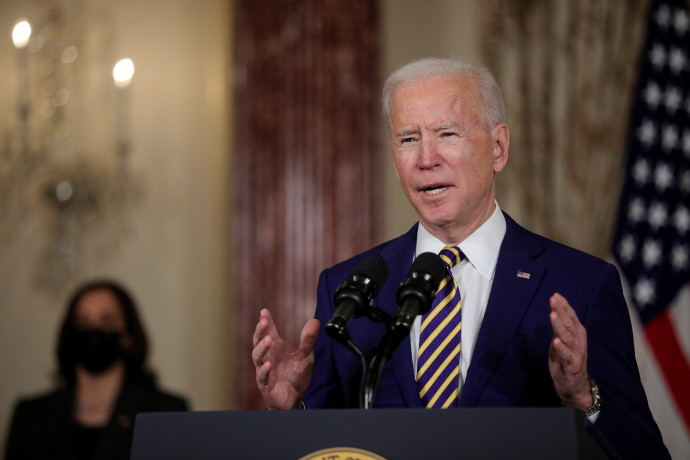
At the moment, there are signs of light and darkness in the Biden administration’s foreign policy. From Israel’s point of view, the situation demands a continued correct and balanced tactic in our current approach to Washington.
President Joe Biden’s rather undiplomatic description of Russian President Vladimir Putin as “a killer” is either a sign that the wheels of his foreign policy are still creaking, or the opposite, that he has decided that the way to rehabilitate America’s standing as a dominating power is by taking a tough stance and raising the volume on his public statements.
Secretary of State Antony Blinken and National Security Advisor Jake Sullivan did the same thing recently in a meeting in Alaska with their Chinese counterparts. It is still not clear how Beijing and Moscow, which recently announced a foreign affairs partnership, will relate to the new American positioning, but Thomas Friedman, a senior commentator for The New York Times, wrote recently that these two countries have lost their fear of America, and in the meantime, as if to demonstrate just that, China announced a 25-year strategic agreement with Iran. Don’t forget that American foreign policy is also failing in North Korea.
Still, the Biden administration has continued and even tightened the sanctions on China and Russia, using human rights violations as an excuse. But somehow this excuse doesn’t apply to Iran, where an administration “clerk” announced that America will not continue to demand that Tehran take the first step in negotiations toward a renewal of the nuclear agreement, and will agree in advance to address additional issues in the new agreement. Thus, Washington agreed to Supreme Leader Ali Khamenei’s inflexible position, and it is clear that the Biden administration’s enthusiasm for a renewal of the nuclear agreement is likely to leave a mark on its relationship with Israel and the Middle East in general.
While there are central personalities in the administration who are known for their love of Israel and their understanding of Israel’s security needs, including Democrats in Congress, there are also those, especially in the State Department, who regard the special relationship between the United States and Israel with skepticism and take uncomfortable positions in relation to the issue of the Palestinians.
Anti-Israel tendencies related to the Palestinian and Iranian issues recently came to light in an article in The New York Times, which reflected criticism of President Biden’s foreign policy from the left, and included a demand to renew (without limitations) the nuclear agreement with Iran and put pressure on Saudi Arabia and Israel. There are also others who are partners to these positions, but use double talk and justify their positions by saying that Israel is the most highly armed country in the Middle East and has good relationships with most of its Arab neighbors, so there is no further need for massive American support.
At this stage, the administration prefers to move toward the left on domestic issues but not on foreign matters, yet you can assume that pressure will continue and even grow in direct proportion to the success or failure of the administration on the economic and social front. At the end of the day, the United States is still forming its policy toward the Middle East, but adheres to the approach of previous administrations in decreasing American presence in the region in favor of the Far East. But, as already noted, what you see from here you don’t see from there. This is true regarding Afghanistan, Iraq, and the rest of America’s effort in the war against Islamic terror, all of which are likely to keep the U.S. focused on the Middle East.
The dichotomy stands out also in regard to the relationship with Saudi Arabia, following the release of an intelligence report that placed responsibility for the murder of opposition figure Jamal Khashoggi on Saudi Crown Prince Mohammad bin Salman, heir to the throne. “The Saudi-American paradise is finished,” reported channel Kan 11, but they forgot that after the expulsion from primordial Paradise, life continued, and that is true regarding relations with the United States and Saudi Arabia. Or, as a State Department spokesman said, “We want to achieve many goals together with the Saudis, like ending the war in Yemen, creating ties for a basis of peace in the Middle East, and preventing the possibility of war with Iran.” Further, “promoting peace between Saudi Arabia and Israel is a shared goal,” the official said.
In short, at this stage, there are both positives and negatives in the Biden administration’s foreign policy. From Israel’s point of view, this requires a continued wise and balanced approach in the country’s relationship with Washington.

Leave a Reply
You must be logged in to post a comment.